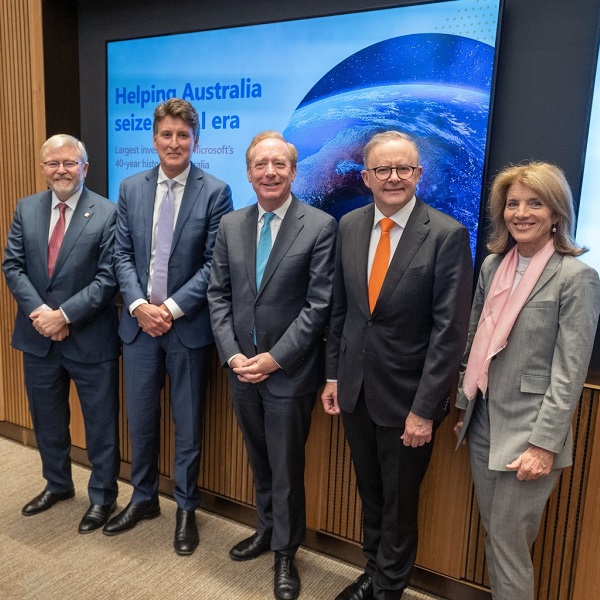
Microsoft announces A$5 billion investment to help expand AI in Australia
Today Microsoft announced major digital infrastructure, skilling and cybersecurity investments in Australia to help the nation seize the artificial intelligence (AI) era to strengthen its economic competitiveness, create high-value jobs and protect the nation from the increasing threat of cyberattacks.
Microsoft will invest A$5 billion in expanding its hyperscale cloud computing and AI infrastructure in Australia over the next two years – the single largest investment in its forty-year history in the country. This investment will also grow Microsoft’s local datacentre footprint from 20 sites to a total of 29 spread across Canberra, Melbourne and Sydney.
To realise the full potential of this new digital infrastructure investment, Microsoft is working with TAFE NSW towards establishing a Microsoft Datacentre Academy in Australia. The company will also extend its global skills programs to help more than 300,000 Australians gain the capabilities they need to thrive in a cloud and AI-enabled economy.
In addition, Microsoft will collaborate with the Australian Signals Directorate (ASD) on an initiative called the Microsoft-Australian Signals Directorate Cyber Shield (MACS), aimed at improving protection from cyber threats for Australian residents, businesses and government entities. As part of this partnership, Microsoft will work with ASD to build fit-for-purpose, next-generation cybersecurity solutions.
Today’s announcement coincided with Australian Prime Minister Anthony Albanese’s state visit to the United States, where he was joined by Microsoft Vice Chair and President Brad Smith, and Microsoft Australia and New Zealand Managing Director Steven Worrall.
Expand Australia’s digital capacity to seize the AI opportunity
Microsoft’s A$5 billion digital infrastructure investment will increase its computing capacity by approximately 250 per cent over the next two years. This will enable the company to meet the growing demand for cloud computing services, which are expected to almost double from A$12.2 billion in 2022 to A$22.4 billion in 2026, according to a whitepaper by International Data Corporation, commissioned by Microsoft.
The investment will also enable Australia to capitalise on the significant economic and productivity opportunities presented by the latest AI technology, which were highlighted in a recent report by the Tech Council of Australia and Microsoft. The report found that generative AI – if adopted at an accelerated pace – could contribute as much as A$115 billion a year to Australia’s economy by 2030.
Microsoft will ensure that its new data centres in Australia help meet the company’s sustainability goals of being carbon negative, water positive and zero waste by 2030. This includes using low-carbon materials during construction, as well as using renewable energy, advanced water-cooling features and measures to decrease diesel fuel use during operation.
Build capability for the era of AI
As part of today’s announcement, Microsoft has committed to support an additional 300,000 Australians as part of its global skills programs, designed to help people gain the skills and capabilities they need to succeed in the digital economy by providing access to learning resources, certifications and job-seeking tools.
In addition, Microsoft is working towards launching its first Datacentre Academy in Australia in early 2024, in partnership with TAFE NSW. The academy’s curriculum will align with core operational roles, including those of data centre technicians, critical environment specialists, inventory and asset management professionals, and IT operations personnel.
Microsoft’s skilling investments are part of the tech industry’s shared commitment with the Australian Government to fill 1.2 million tech-related jobs across the country by 2030.
Strengthening the nation’s cyber defences
The Microsoft-ASD Cyber Shield (MACS) builds on the longstanding partnership between Microsoft and the Australian Government, where the exchange of cyber threat information has led to better protection for Australian residents, businesses and government entities. The collaboration will enhance the government and Microsoft’s joint capability to identify, prevent and respond to cyber threats, which are growing in both frequency and severity.
To highlight the scale of the problem, ASD’s national Cyber Watch Office received more than 76,000 cybercrime reports in the 2021–22 financial year, an increase of nearly 13 per cent from the previous year. This equated to one report every 7 minutes.
MACS will include the evolution of national threat intelligence sharing capabilities, with a focus on detecting, analysing and defending against sophisticated nation-state cyber threats.

